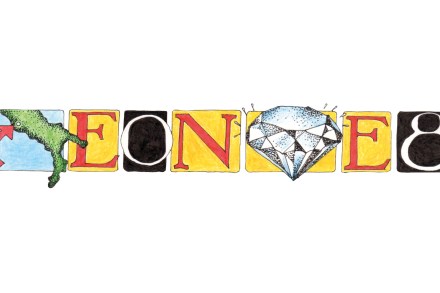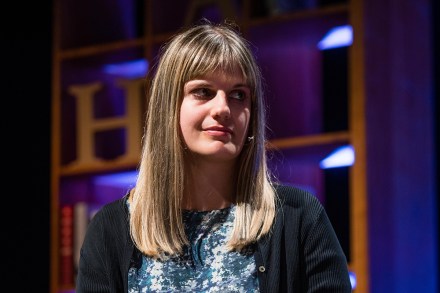Spot the Shakespeare play
For answers, click here

For answers, click here


Much like its editors, I have no idea who Poetry for the Many is for. However, the choir it preaches to is quickly identified. It opens with a dedication to Julian Assange, the free speech martyr in no way a narcissist patsy for a hostile state. A member of UB40 summarises the book’s aim on

Emperor of Rome? Is there a typo in the title? Mary Beard’s latest book is about not one but 30 Roman emperors, from Julius Caesar (assassinated 44 BCE) to Alexander Severus (assassinated 235 CE), so why the singular? The answer is that Emperor of Rome is a study of autocracy and one autocrat, as Marcus
Jungle House is not the sultry tropical tale you might expect either from its title or from its vivid, palm-strewn dust jacket. Instead, Julianne Pachico’s third novel concerns AI. This is not immediately obvious, and although there is an appealing directness to the writing, it means that no time is spent setting the scene or

It’s been said again and again but rarely so plainly illustrated: American life is now too berserk for fiction to keep up. Tim O’Brien’s wild, rollercoaster satire America Fantastica is as wacky as its title suggests; but it can’t compete with the daily trainwreck that calls itself the land of the free and the home


‘These things start on my birthday – like the Warsaw Uprising – and spoil my day,’ wrote the understandably self-pitying Barking housewife Pat Scott in her diary on the first day of the Cuban Missile Crisis in October 1962. ‘And then to spoil it more, Ted [her husband] took his driving test for the second

Tribal rivalries have existed from humanity’s beginning and have fuelled the creation of every prestigious monument ever built. By the Age of Science we were building not pyramids but ironclads and submarines fighting for ascendancy at sea, expanding our empires in spite of an ever-growing movement for colonial independence. The Spanish-American war of 1898 added

New books by, articles about or Sasquatch-like sightings of J.M. Coetzee routinely send me back to that infamous YouTube clip of Geoff Dyer face-planting while being introduced by Coetzee at the Adelaide Book Festival – an episode often cited as evidence that the Nobel Laureate has no sense of humour. The garlanded ex-South African’s work

Music is an art of time: songs play to a rhythm, giving shape to the seconds as they pass, charging the present with a pulse we can feel. But as music takes us forward through time it also takes us back – to the moment of its composition or recording; to a particularly resonant time

Generations of readers of Enid Blyton’s Famous Five series have enjoyed the books without having to contemplate the erotic properties of the canine member of the quintet. After reading Nicholas Royle’s one-of-a-kind fantasia on Blyton and David Bowie, they may never be able to do so again. Royle writes confidently that ‘the most obvious route
Obviously, the best and funniest gift book out this Christmas is my own Still a Bit of Snap in the Celery (Abacus, £16.99), about the horrors and delights of being 60, but I am far too humble and modest to mention it, so I won’t. Very nearly as good is Bob Cryer’s Barry Cryer: Same

I am working on a play about Marilyn Monroe at the moment and, reading Britney Spears’s book, the similarities of these two fragile blondes came to mind. Both were celebrated and castigated for their woman-child sex appeal; both struggled with sinister Svengalis – Darryl Zanuck and Mickey Mouse. But one big difference between the two


Just as extreme altitudes have notable effects on the human body and mind, so too does extreme wealth seem to have a particular effect on psychology. Or at least that’s how it appears when you look at the shared ambition of two of the world’s most prominent billionaires, Elon Musk and Jeff Bezos. Both men

I am a big fan of Mark Kurlansky. His Cod is one of a handful of books I recommend to people keen to learn about the way in which certain foods have helped shape the world we live in. But while The Core of the Onion has its moments and is an enjoyable read, it’s

Faith in state planning was central to Harold Wilson’s pledge to modernise Britain. It was his rhetorical vision of a country guided by strategic foresight and ‘forged in the white heat of technology’ that helped him win the 1964 election. But Wilson also displayed the same attachment to planning in his personal life. Back in

In the 1960s and 1970s, British music was transfixed by the Manchester School. Led by the composers Harrison Birtwistle, Alexander Goehr and Peter Maxwell Davies, this northern powerhouse of art music also included the brilliant pianist John Ogden and the conductor Elgar Howarth. All five had studied in the city in the early 1950s. Yet
The subject that Sarah Ditum addresses in Toxic is why the early part of this century was ‘such a monstrous time to be famous and female. It’s about how the concept of privacy came undone and why that was a catastrophe for women’. The concept of privacy was actually undone by a judge in Tulsa,

I rather bristle at newspaper column collections. They strike me as a bit lazy, a cheat’s way of getting another book under the belt, often just in time for the gift-giving season. When it comes to Rachel Cooke’s Kitchen Person, however, I have to eat my words. It draws from the 14 years of monthly

The sirens sound in the street. The lockdown order comes. The images on the television are of chaos and illness, total societal collapse. The apocalypse is here, and where are the rich? Already holed up in their survival compounds, ready to ride out the end of the world before emerging to take control of what’s

Once a King is trumpeted as ‘game-changing’, a ‘trove of never-before-seen papers which shed fresh light on the maligned Duke of Windsor’ and will ‘turn on its head long-accepted stereotypes’ about him. These are bold claims, but do they stack up? ‘The lost memoir of Edward Vlll’ actually consists of an early draft of the
